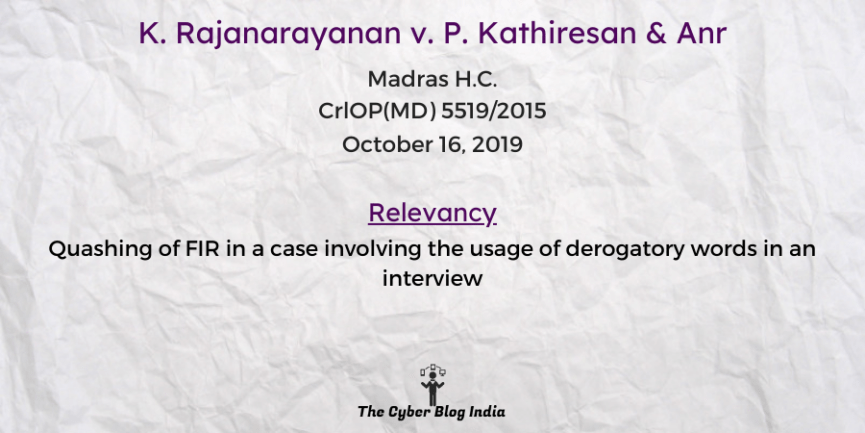K. Rajanarayanan v. P. Kathiresan & Anr

K. Rajanarayanan v. P. Kathiresan & Anr
In the High Court of Madras
CrlOP(MD) 5519/2015
Before Justice G.R. Swaminathan
Decided on October 16, 2019
Relevancy of the case: Quashing of FIR in a case involving the usage of derogatory words in an interview
Statutes and Provisions Involved
- The Scheduled Castes and Scheduled Tribes (Prevention of Atrocities) Act, 1989 (Section 3(1)(x))
- The Information Technology Act, 2000 (Section 66A)
- The Indian Penal Code, 1860 (Section 504)
- The Code of Criminal Procedure, 1973 (Section 482)
Relevant Facts of the Case
- In an interview, the interviewer asked the petitioner why he did not not write about Dalit life. He replied that he was not familiar with the dialect. Hence, he did not make any attempts to portray their lives. In the FIR, the complainant claimed that the petitioner used disrespectful words in this interview.
- According to the complaint, the petitioner intentionally insulted the Schedule Castes, as per Section 3(1)(x) of the SC/ST Act.
- The petitioner has approached the High Court to quash the FIR and relevant criminal proceedings.
Prominent Arguments by the Advocates
- The government’s counsel submitted that the word used was Avan, instead of the usual trend of using ar, which is respectful. The complainant has also taken an objection to using the term Dalit.
Opinion of the Bench
- The court relied on the assistance of a young Tamil scholar. The bench deduced that the word Avan refers to males. Whether it is disrespectful would depend more on the context.
- The Delhi High Court, in P. Vats v. State, held that if an utterance was not against an individual of the SC/ST community, it would not constitute an offence under Section 3(1)(x) of the same.
- The court also relied on the case of Fiona Shrikhande v. State of Maharashtra. Under Section 504 of the Indian Penal Code, 1860, the insult must be intentional and provocative, and the person should know that it would cause a breach of peace. The present case does not satisfy these essentials.
- Further relying on the case, Fiona Shrikhande v. State of Maharashtra, which laid down that for an offence under Section 504 of the Indian Penal Code, 1860, the insult should be intentional, must be provocative and must intend to or know that it would cause a breach of peace. These essentials were not satisfied here.
- The Supreme Court has already struck down Section 66A of the Information Technology Act, 2000, in Shreya Singhal v. Union of India.
- Any Magistrate or police should not be eager to take cognizance of such cases without understanding the law on free speech. Cases like these cause damage to the court’s image.
Final Decision
- The court allowed the petition.
Akshita Rohatgi, an undergraduate student at the University School of Law and Legal Studies, GGSIPU, prepared this case summary during her internship with The Cyber Blog India in January/February 2021.
